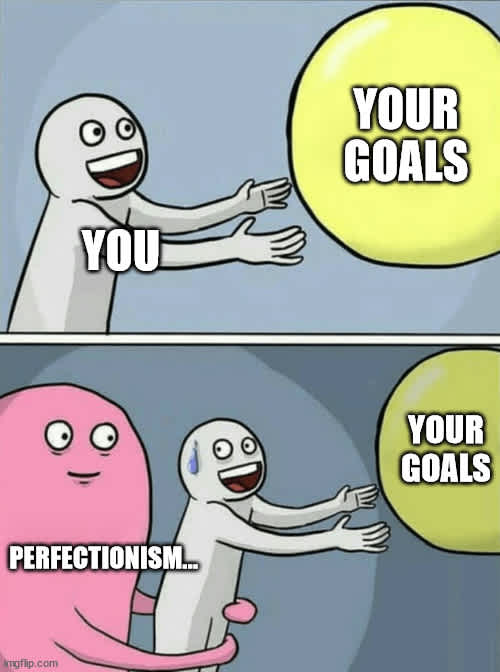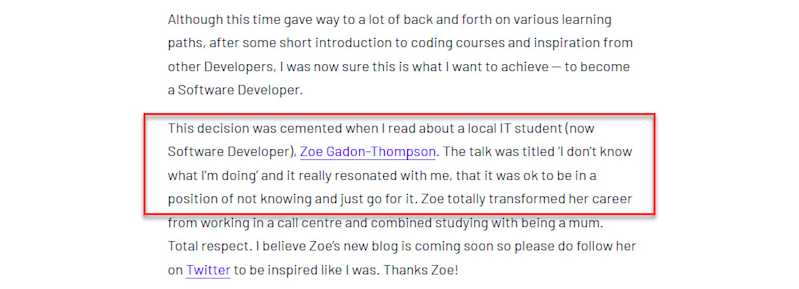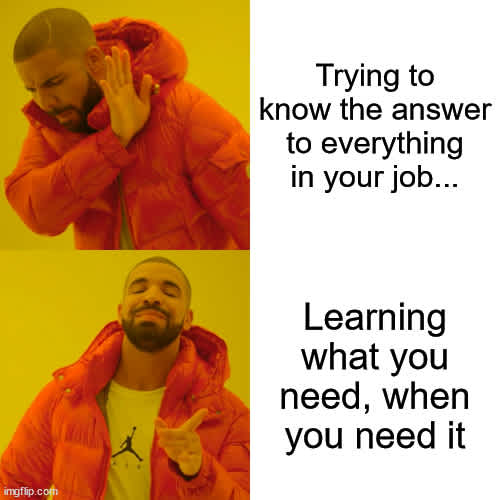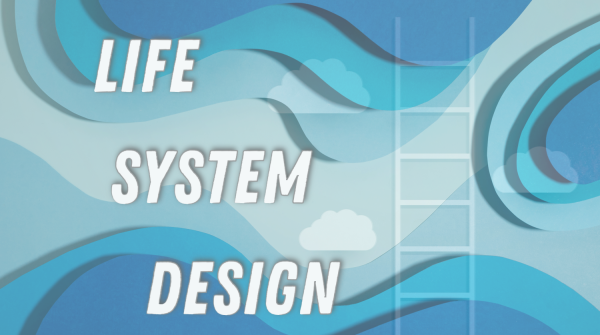Do you ever get the feeling that you’re just not good enough? Like you’re a fraud and it’s only a matter of time until you get found out and lose your high-paying programming job?
Or maybe that any success you’ve had so far is just blind luck?
Well, you’re not alone in this. In fact, this question of feeling like you’re not good enough and how to get past it comes up all the time in the tech industry, and for good reason.
So in this guide, I'm going to explain exactly why this happens, why you're NOT an imposter, and how to get past it depending on the root cause that's specific to you.
Sounds good? Well, let’s dive in!...
What is imposter syndrome?
Sometimes known as the ‘imposter phenomenon’, ‘imposter experience’, or even ‘pluralistic ignorance’, Imposter Syndrome is a feeling that you’re unworthy of your current success.
You feel that somehow you’ve tricked everyone and it’s only a matter of time before everyone realizes and it all comes crashing down.

The reality though is that top performers in multiple fields also suffer from this in some shape or form.
Heck, even Albert Einstein thought he was undeserving of the level of praise for his work, while Tom Hanks can’t understand why he keeps getting hired!

They both suffer from the same root cause. However, the trigger for them, might not be the same trigger for you (more on this in a second).
What is the cause of imposter syndrome?
You might think it’s because of a disease, a mental illness, depression, or even general anxiety, and yes they can all be a factor. However, imposter syndrome is not explicitly tied to these.
Studies show that the actual root cause of this fraud-like feeling is more likely to be based on your current situation, any large life changes, and how you function as a person. You can be perfectly happy in all other aspects of life and still feel like an imposter.
In fact, imposter syndrome is incredibly common across all races, gender, age, and occupations, although it is more frequently experienced by people who are highly accomplished. The reason for this is they will often look at their peers and their success and feel that their peers are more deserving than they are themselves.
“That person is doing such amazing work... I’m clearly faking it compared to them.”
The thing is, because so few people talk about this openly, you make the mistake of thinking that it’s only you who feels this way.
The reality is we all feel like imposters from time to time. The trick of course is both knowing this, and then learning how to deal with it so that it doesn't stop us from performing our best or limiting our careers.
The 5 archetypes in imposter syndrome
So what triggers imposter syndrome?
Well there’s a few different things that can cause it based on your personality, current situation and prior life experiences and how you use those to deal with stress.
We can bucket these into 5 groups or ‘archetypes’:
The Perfectionist
The Super Human
The Soloist
The Natural Genius, and
The Expert
Some people actually overlap between a few of these but let's break them down. The sooner you understand them and what’s causing these feelings, the quicker you can recognize the triggers and start moving past them.
The Perfectionist
Perfectionists are driven by the achievement of goals. They set a very high bar for themselves and others, and when it’s not met they suffer from self-doubts and fears.
This is especially common in high performing professionals who compare themselves to their peers, and their successes.
Common signs of a perfectionist are:
Micromanagement of tasks
Trouble handing off tasks or delegating, and when they do, they get frustrated if it’s not 100% perfect
Connecting their self worth to their ability to achieve goals
Slumps when goals are not hit

The thing is, there is no perfect state. Even if it's achieved, it's over as soon as it's accomplished, and so living like this creates large highs and lows.
Olympic athletes struggle with this as they train their entire life for this one event, and even if they win, they get depressed after.
So how can we get past these archetype triggers?
By learning to love the process and not the end goal
Celebrating small wins and not holding off for the big ones only
Gratitude and analysis of where you are and where you were
Removing success from your self worth
Understanding that mistakes are the ONLY way to learn effectively
Being happy with 80% good enough
You don't need to know every answer or have the most polished project to reach your goals...

The Super Human
The superhuman also feels like a fraud among their peers, but they handle it differently. This feeling of being a fake causes them to put in more hours, longer days, weekends etc.
Anything to help them feel like they are deserving of their success and mask their fears and insecurities.

The thing is, this excess workload brings exhaustion and poor work quality, which then causes a lack of external activities, often sacrificing social interactions, hobbies and personal relationships.
This type of archetype is very often seen in people who have recently found success, and this happens a LOT in programming.
Why?
Well, what other industry can you go from being a waiter struggling to pay bills and learning to code on your days off, to getting a junior position with a 6 figure salary almost overnight?

That didn't happen with this person but it is common in these situations. Simply because this life change is a huge shock to your system and you can feel like a fraud, even when you know that you are good enough to be where you are right now!
So how can you get past this?
Again, learn to enjoy the process and not the end goal. You need to remove yourself from the endorphin high of completion
Recognize that you’ll actually be more efficient and complete things faster, when you rest and take time for yourself
Don’t work weekends unless it’s a life or death situation. The more rested you are the better you’ll be at noticing what's important and prioritizing. Focus on the 20% tasks that produce the 80% of results instead
The Soloist
The soloist tries to do everything on their own. In their mind, they feel that asking for help may seem like weakness, and they'll be seen as a fraud.
If you work in tech then chances are you may be slightly introverted and that’s totally fine. You have to understand though that asking for help is actually a sign of strength.

It shows you’re willing to accept when you can’t do something right now, and that you’re willing to learn so that you can do it in the future.
Oftentimes this leads to you being far more confident and removing any self doubts about yourself. That's why communication is so important for this archetype:
Ask for help
Admit if you don’t know something
But then try to learn what you're missing. (Unless its completely outside your field of expertise)
The key is to try and figure out a problem yourself first and see if its feasible for you to learn. If not though, make sure you don't "spin your wheels" and spend hours on a problem.
Ask your peers and team lead, and start by explaining what you've done so far to try and solve the problem on your own. Even better if you can outline a few potential solutions you've found but just need their help identifying the best one.
Trust me on this, your boss will appreciate the fact that you tried to solve the problem in multiple ways first but also didn't waste your whole day trying to be a Soloist hero (which is counter productive).
They’ll see this as a plus in your skillset. It’s far better to have an employee who accepts their flaws and keeps learning and working on them, then it is to have one who never learns or asks for help.
You’ll get tasks done faster and avoid burnout!
The Natural Genius
A combination of the soloist and perfectionist, the Natural Genius measures their self worth with the ease that they can do something.
If it's easy to them, then it must not be a big deal, so the praise seems false, and that's why they feel like a fraud (This is the exact same thing that Einstein and Tom Hanks suffer from).
The problem of course is when things are genuinely difficult, they can move towards self sabotage.

This is especially the case when you've been naturally gifted (say at sports) and then you try to learn something totally new like learning to code.
So how can you get past this?
Be aware of how far you've come and what you know already. Just because it's easy doesn't mean its not valuable
When things are hard, realize that making slow progress is still progress. When something is feeling tough or like too big, break it down into smaller chunks (could be a task, project, topic you're learning)
Focus on the path to your goal. Don’t learn everything. Learn this one thing and then the next. Measure that progress
Embrace the difficulty and enjoy the challenge. You have to understand that learning by doing is one of the most valuable and effective ways to actually get good at something
And remember to ask others for help!
Building your first project or learning a new skill on your own will be excruciating and feel like it's taking forever, but throughout that process you are learning so much... way more than any tutorial. And the feeling you'll get once it's done will be pure joy and make you want to try something just a little harder next time and then it snowballs from there.
This is how we structure courses at ZTM because we understand this.
Our goal is to get you creating something as early as possible in your learning process, because we know the impact it can make on your confidence.
The Expert
The Expert places their value on how much they know on a topic. If they don’t know something, they feel like they’re a fraud and so they’re constantly learning.
That’s not a bad thing as it can lead to more knowledge, but the expert will often avoid opportunities or make decisions UNLESS they meet or exceed all criteria. This often leads to them procrastinating and never starting.

Fear of making mistakes holds back so many smart people. You will learn SO MUCH MORE from trying and failing.
Editor's note: There's a guy I train with at Jiu Jitsu who gets absolutely smashed, non-stop for 2 hrs per class, 3x a week.
He'll get submitted again and again, and keep going, whereas more experienced people will sit off to the side when having a bad day.
But because of this willingness to be 'be bad' and make mistakes, his progress has been insane, and is now a difficult opponent for people who used to find him an easy target. All because he knows that the path to learn is making mistakes.
You need to embrace the same type of thinking, because daily life and decisions are not life or death situations. The key is willing to make the mistake and then fix it and adapt.
You'll find it so much easier if you embrace problem solving and remove the perfect choices.
This is another archetype that is common amongst people learning a new skill.
We see it all the time...
They feel like they need to get to some perfect (or expert) level before they can actually get hired or even move on to the next topic. And so they try to memorize every piece of syntax and take 10 courses on the same language before they feel "good enough".
But the reality is they just keep learning and not taking action.
So how can we get past this?
Realize you will never know everything, nor will you know the answer to every possible question in advance and that’s fine. Being able to learn what you need for now, add to it and adapt is a far better skill to have
Focusing on learning what you need to know when it's needed rather than all in advance
Teaching others can often help you learn faster and also help you see that it’s ok to make mistakes and not know everything
Understand that you already have value. You deserve your current success regardless of how much you know, but for the value you create
This is a big reason why our tech courses and career paths are set up specifically to help prevent this and snap people out of this mindset.
Become a Fullstack Web Developer
13 milestones 9 courses
Step-by-step roadmap where you'll learn to code and build a portfolio.
Curated curriculum of courses, workshops, challenges, projects, and action items.
Become a Fullstack Web Developer from scratch and actually get hired.
Earn on average per year:
$115,887
US salary data collected from Indeed, LinkedIn, and Web3.career 2026.
How?
By only teaching you what you need to know to get hired (or promoted). This helps you get past the procrastination and fast-track you to start learning on the job.
11 Bonus tips to help you deal with imposter syndrome
So far we've covered a lot of specific tips for different root causes. However, here's 11 more tips to help you that almost regardless of which archetype you are.
Make sure to give them a try!
Understand that imposter syndrome is an ongoing thing. It will never go away but you can learn to work through it. Everyone who is highly successful suffers from this at all stages of their career. Some just push through as they know it never goes away. Others understand the causes and build systems to deal with them like we've covered so far
Figure out which ‘Imposter Archetype' you are and learn what triggers you as well as what your imposter signals are (i.e Are you working the weekend? Or beating yourself up because you think that somethings not perfect?). Noticing these signals early can help you stop the cycle now
Be sure to rest and recharge. Often exhaustion can be a trigger for anxiety which can lead to feelings of fraud and then us leaning into your specific imposter activities
Acknowledge your feelings of doubt or perfectionism but try to step outside of your thoughts and emotions. Are these things real or are they in your head? Are you sleeping ok? If you’re rested and you think there's an actual issue, then it's time to…
Communicate with your peers and management. These feelings of doubt in your performance are more than likely in your head. Speaking to others to see that they also feel the same way will help with your confidence. Sharing your feelings with your management will help remove any doubts all together. In fact, they’ve probably felt the same thing, and knowing this, it can help you deal with it also. You’re far more likely to be praised and given positive feedback. And if there is an actual issue, you can resolve it and improve and not dwell on it
Allow others to help you. You don’t need to do everything yourself. Showing that you’re willing to learn and embracing this removes any hold it has over you
Stop comparing yourself to others. Everyone is different and we’re all good at different things. Your peers may be the fastest runners in the world but you’re still on the podium or in the arena! You earned where you are right now. You don’t need to be the absolute best to deserve your success.
Keep track of your achievements and celebrate the small wins. Gratitude journaling helps to both remove anxiety while also helping you to see how far you’ve come already.
Help others. Not sure of your success so far? A great way to realize how far you've come is to help others. If you're a member of ZTM then the best way to do this is to jump into our Discord community and help answer one person's question
Get comfortable with being uncomfortable. Adopt a growth mindset and always be learning. Realize you can't know everything and use that as a yardstick. This is especially true in any tech field. Don’t assign your personal value to how much you know on a topic. Learn to value your ability to figure things out when needed instead!
Practice soft skills. The highest performers I know all struggle with these same issues. However, a practice of short meditation can work wonders to help reset your brain
Time to embrace imposter syndrome
If I'm being honest, it sucks but imposter syndrome never really goes away.
The key is to learn how to deal with it better so you can remove that fear and doubt or even learn to harness it.
How?
Well, it may seem hard right now but if you can face your issues and doubts head on, you’ll soon see that the image in your head and the actual reality was either nothing at all, or much less important. Do this often enough and you’ll start to see that fear as the sign that this is something important that you should get done. You can use it as a radar for those big opportunities that you might have said no to before!
Is it scary? Then do it!
And trust me on this. I don’t know your current situation but I have no doubt that you deserve the success you have right now and any future wins also.
You got this buddy 😀.
Best articles. Best resources. Only for ZTM subscribers.
If you enjoyed this post and want to get more like it in the future, subscribe below. By joining the ZTM community of over 100,000 developers you’ll receive Web Developer Monthly (the fastest growing monthly newsletter for developers) and other exclusive ZTM posts, opportunities and offers.
No spam ever, unsubscribe anytime

![Learning to Meditate [Productivity & Focus]](https://images.ctfassets.net/aq13lwl6616q/2a7NI2zgRFphCk8pnDHBYF/34433f9991c8952427f112d428014bc6/Meditation_Thumbnail_2-_Academy.png?w=600&h=335&q=50&fm=png&bg=transparent)

![Learning to Learn [Efficient Learning]](https://images.ctfassets.net/aq13lwl6616q/6VWcUgLgG0SU55ORlILe2S/e186361aeb48561bcd19ae6486577022/Learning_to_Learn.jpg?w=600&h=336&fl=progressive&q=50&fm=jpg&bg=transparent)





